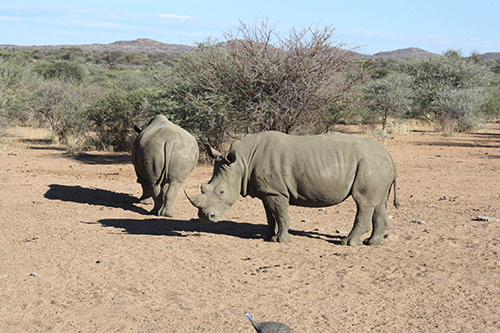Namibia will ask CITES to allow the sustainable hunting and trade of white rhino, saying the revenue derived from it would go directly back into conservation and anti-poaching programmes as well as equipment, law enforcement, education, community initiatives, infrastructure and habitat management.
Namibia has an increasing population of white rhinoceros, the second largest population in the world after South Africa.
With the upcoming 19th CITES meeting of the Conference of the Parties in Panama, Namibia is pushing to trade in white rhino trophy hunting, arguing trade in live animals will take place for in-situ conservation purposes only.
CITES (the Convention on International Trade in Endangered Species of Wild Fauna and Flora) is an international agreement between governments.
Its aim is to ensure international trade in specimens of wild animals and plants does not threaten the survival of the species.
From 2008 to 2021, a total of 94 white rhinoceroses were hunted.
This amounts to 0.5 to 0.6% of the population, far below the rate of recruitment and overall population growth.
A significant number of adult males are periodically dehorned, which reduces the number that can be hunted each year.
Demand for white rhinoceros from private farmers in Namibia is high.
In pursuit of trade in white rhinos and allowing trophy hunting, Namibia has prepared proposals for amendment to the existing rules.
The CITES meeting is scheduled to take place from 14-25 November 2022 in Panama.
Over the past 13 years, permits to import 629 white rhinos from South Africa were issued, with imports drastically increasing since 2012.
Although Namibia has exported 54 white rhinos from 2008 to 2021 to Angola, Cuba, the Democratic Republic of the Congo, South Africa and Zambia, the “primarily commercial purposes” restriction applying to Appendix I animals has severely limited Namibia’s ability to generate revenues for conservation.
Appendix I includes species threatened with extinction. Trade in specimens of these species is permitted only in exceptional circumstances.
Appendix II includes species not necessarily threatened with extinction, but in which trade must be controlled to avoid utilisation incompatible with their survival.
Namibia believes transferring the population to Appendix II will create access to a far larger market for white rhinos.
In the proposal for amendment of appendices I and II, Namibia argues it thus cannot find sufficient markets for surplus live rhinoceros and encourage meaningful private sector participation in rhinoceros conservation in a commercially-driven economy with the existing CITES Appendix I restrictions and conditions.
The proposed submission to CITES states if Namibia can encourage private sector participation in rhinoceros conservation as South Africa has so successfully done, the amount of habitat available to white rhinoceros and occupied by white rhinoceros can be vastly increased.
“The Namibian white rhinoceros population is secure. The population does not meet the biological criteria for inclusion in Appendix I. The proposed transfer to Appendix II will not threaten the survival of the species in Namibia, as the necessary control and enforcement measures are in place and have shown to be relatively successful in curbing illegal killing and illegal trade,” the proposed paper shows.
Namibia contends trade in hunting trophies (as is already done) will enable the generation of income for conservation management and rhinoceros protection.
Equally, it has been proposed the increasing financial burden caused by the increase in the threat of illegal killing needs to be addressed through the sustainable use of white rhinoceros.
Fr Namibia’s private sector to be encouraged to participate meaningfully in the conservation of the white rhinoceros, an economically conducive climate needs to be created, the paper argues.
Neighbouring South Africa has already transferred its population to Appendix I, which resulted in the rapid increase in live rhinoceros sale prices.
“The prices for Appendix I white rhinoceros in Namibia are lower than the South African prices because marketing opportunities are far more restricted. South African buyers will not pay Appendix II market-related prices for Appendix I animals due to the restrictions that apply to Appendix I animals. Namibian buyers will not pay Appendix II prices to acquire additional rhinoceros if they lose market value by such rhinoceros acquiring Appendix I status upon their import into Namibia,” the 10-page paper highlights.
– anakale@nepc.com.na


